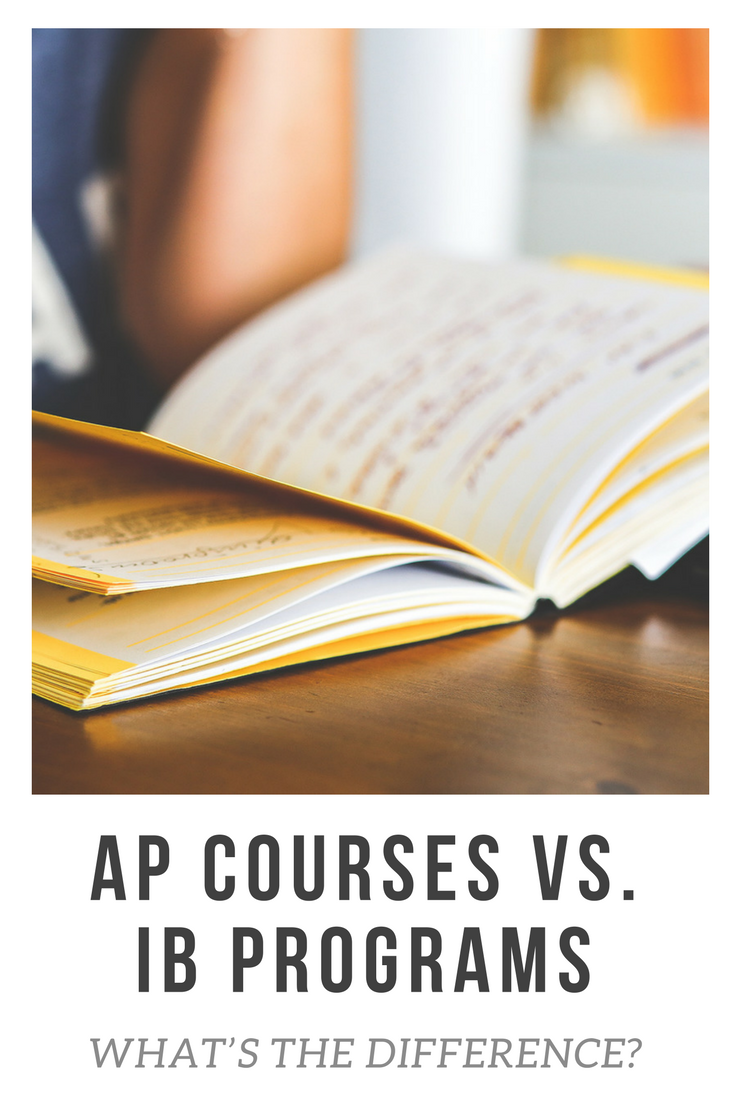This is a guest blog post written by our friends at Admissionado, the most gifted, committed experts in college admissions. Admissionado’s team of college mentors have been to the Ivy Leagues themselves, and excel in helping students get into the world’s best schools. We encourage you to learn more about Admissionado and check out the original post!
Students looking to challenge themselves academically may find themselves wondering which courses will best prepare them for higher education.
While AP courses remain the most popular option for students to challenge themselves outside of the standard curriculum, an increasing number of high schools in the US are offering the International Baccalaureate program. So does one have a better reputation? Or is one more rigorous than the other? As someone who was lucky enough to get a taste of both, I’m here to weigh in on each program’s strengths and weaknesses.
What is Advanced Placement?
Advanced Placement (AP) was developed in the United States by College Board in the 1950s to help bridge the gap between high school and college. The program gives students a taste of intro-level college courses as well as a chance to earn college credit, which can save both tuition money and time spent on intro-level college courses. In order to get credit, students can enroll in an AP class at their local high school and take the corresponding AP exam, which tests what is learned in the class. In order to earn college credit, students must earn a high score on the exam.
What is the International Baccalaureate Program?
The International Baccalaureate (IB) Diploma Program (DP), born in Switzerland in the 1960s, is a rigorous, internationally-recognized diploma designed to prepare students for higher education. The DP curriculum is made up of the “DP core” and six subjects (literature, language acquisition, individuals and societies, sciences, mathematics, and the arts). The six subjects can be taken at either a “high level” or a “standard level,” depending on an individual student’s strengths and weaknesses. The DP core is made up of three components:
- theory of knowledge (TOK), in which students reflect on the nature of knowledge
- the extended essay, a 4000-word independent research paper
- a project related to creativity, activity and service
There is potential to earn college credit in any of the six subjects. While no credit is awarded for the DP core, these activities will invariably boost any student’s resume, improve writing skills, and prepare students for university-level research.
Accessibility
While both programs are widely recognized by colleges and universities in the United States, AP courses are far more accessible than the IB diploma. In 2014, College Board reported that more than 14,000 public high schools offered AP courses in the 2012-2013 school year. According to the IB website, only 868 US schools currently offer the diploma program, more than 90 percent of them public.
Flexibility
In addition to being more accessible, the AP route is also more flexible. While most students will take an AP class at their high school to prepare for an AP test, it actually isn’t required. Students who are especially self-motivated or knowledgeable in a particular subject can opt to take an AP exam sans the corresponding class simply by studying for it on their own. There are even platforms that offer AP courses online.
IB exams, on the other hand, cannot be taken on their own without their corresponding class. However, students do have the option of taking IB courses for credit without pursuing the two-year IB diploma, and it is possible to take these courses online.
Cost
The fee for each AP exam is $92 in the United States; however, College board will provide a $30 fee reduction for students eligible for financial aid. The cost for an IB exam varies from school to school in the US, hovering around $100. According to the official website, the IB diploma program consists of two types of assessment fees: a one-time $164 registration fee, which includes TOK and extended essay assessments and all exams in a given examination session, and a $113 candidate subject fee, for each subject taken by a particular student. While the fees may seem steep at first glance, keep in mind they are much less than college credits. (A single college course can cost thousands of dollars!)
Grading
In order to get credit, students must do well on the exams, regardless of the program. AP courses will be graded like any other course at your school, while the exam is graded on a scale of 1-5, 5 meaning “extremely well qualified” and 1 meaning “no recommendation.” Most colleges and universities will grant credit for a 3, 4 or 5, but this is up to each individual school to decide. To learn more about college policies on AP scores you can visit College Board’s handy AP Credit Policy Search.
Both high level and standard level IB courses are graded on a scale of 1 to 7, with 7 being the highest; however, some colleges and universities will only award college credit for high level courses and not standard level courses. An IB diploma candidate is required to take three subjects at a high level but is not permitted to take more than four.
Which program is a better fit for my child?
When determining which program is right for your child, it is important to consider what type of student they are and what type of schedule they have. The IB diploma program has a heavy emphasis on writing, which might be an advantage to a student who is a particularly strong writer or one who is looking to improve their writing skills. Most IB programs require students to devote a significant amount of time to the extended essay over the summer, which might not be suitable for students who are very involved in sports or other extracurriculars. Earning college credit in an AP program, on the other hand, requires being a very good test taker. If a student tends to do well in classes but struggles during exams, AP might not be the best option.
Your decision may also be determined simply by where you live. It is important to remember that colleges and universities are looking to see if a student has challenged themselves within the context of his or her school. In other words, don’t feel the need to enroll in a private school or move to another district simply to give your child access to a particular program. All things considered, both AP and IB are regarded as equally rigorous and prestigious and will invariably give your student a leg up in the application process.
Here’s a quick recap of things to consider when deciding which program to pursue:
- Do some research to determine which program is offered by your local high school.
- While AP offers more flexibility, the IB diploma is a more structured and highly comprehensive program.
- AP exams are $92 a pop, while IB exams cost roughly $100 (which includes the cost of the course). There is an additional $164 registration fee for students pursuing the IB diploma (which includes guidance through TOK, the extended essay, and a community service project).
- Both programs require that students do well on exams to earn college credit and allow students to showcase their strengths.












